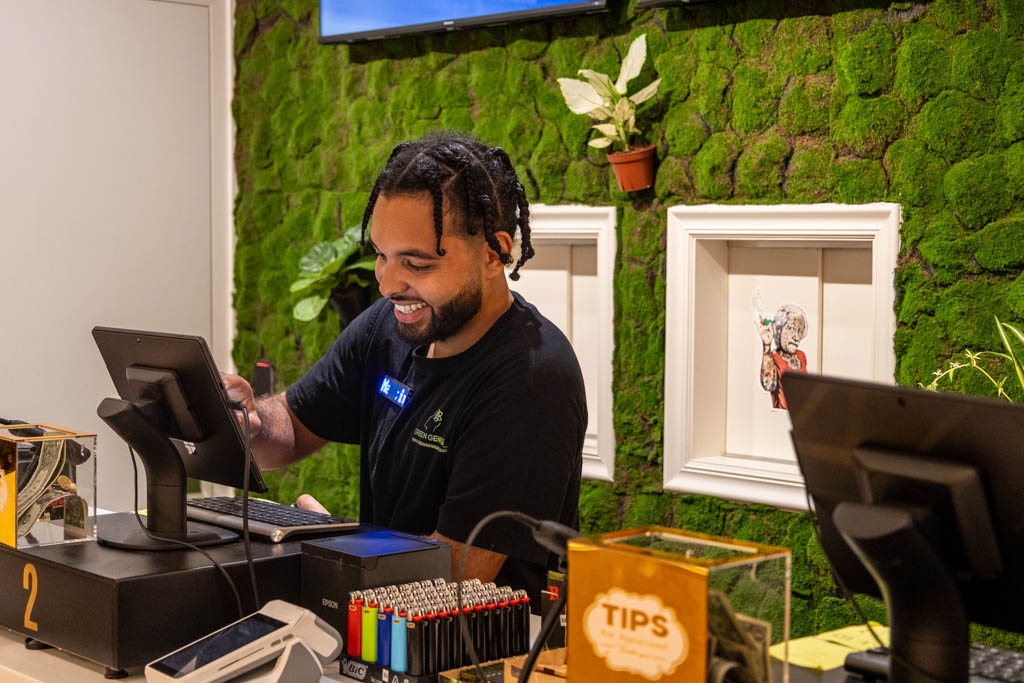What Does a Budtender Do?
If you’ve walked into a legal dispensary in New York recently, you’ve probably met a budtender—the cannabis equivalent of a barista, pharmacist, educator, and sales associate all rolled into one.
But what exactly does a budtender do? And what makes a great one stand out from someone who just reads off the menu?
This article explores what the role of a budtender really entails, especially in New York City’s emerging regulated cannabis market, and why they’re critical to both customer experience and a dispensary’s success.
More Than Just a Salesperson
A great budtender isn’t just a cannabis enthusiast—they’re a skilled communicator, product expert, and front-line brand ambassador. They help customers navigate an often overwhelming number of options: flower, vapes, edibles, tinctures, concentrates, and more.
They translate product jargon into plain language, asking the right questions to identify what someone is actually looking for.
Is the customer looking to relax after work? Focus during the day? Sleep through the night? A seasoned budtender can make tailored recommendations based on effect, delivery method, and past experiences—even when a customer can’t quite articulate what they want.
Sales Are Part of the Job
While education and guidance are at the core, budtenders are also responsible for sales. They need to understand how to cross-sell, upsell, and recommend products that align with both the customer’s needs and the store’s sales priorities.
That means highlighting daily or weekly promotions, recommending bundle deals, and introducing customers to new brands or products they may not have tried before.
An effective budtender keeps track of which products are moving, what inventory is overstocked, and which items might need a little push. They play a direct role in improving average transaction size, conversion rate, and product turnover—metrics that directly impact a dispensary’s bottom line.
And let’s not forget about suggestive selling—“If you liked that indica, you might want to try this pre-roll on sale today.” Great budtenders do it without being pushy, and customers appreciate the help.
Helping Customers Come Back
Customer experience doesn’t end at the point of sale. A big part of a budtender’s job is driving retention.
That includes:
-
Encouraging customers to join the loyalty program
-
Helping them sign up for email and SMS promos
-
Explaining how to earn and redeem points
-
Promoting return-visit incentives like referral bonuses, early access to drops, or exclusive merch
Budtenders also build relationships. They remember names, preferred products, and favorite brands. That personal connection builds trust, and trust builds loyalty. For a dispensary trying to stand out in a competitive market, that’s gold.
Understanding Compliance
In New York’s legal market, compliance isn’t optional—it’s everything.
Budtenders must:
-
Verify that every customer is 21+ with valid ID
-
Know what products can and can’t be recommended based on effects or medical claims
-
Ensure proper labeling, packaging, and exit procedures
-
Use state-approved POS systems and follow METRC tracking regulations
Any slip-up could jeopardize a dispensary’s license. Budtenders are often the last line of defense between legal operations and state violations.
Every Customer Is Different
Some customers come in with experience and specific product preferences. Others are completely new to cannabis—maybe nervous, maybe curious, maybe both.
Budtenders have to meet people where they are. That means being part educator, part concierge, and part therapist. They field questions like:
-
“What’s the difference between a hybrid and a sativa?”
-
“How long does an edible last?”
-
“Will this make me anxious?”
-
“Can I drive after I take this?”
Answering these questions with empathy and knowledge can turn a one-time shopper into a regular.
What Budtenders Wish More People Knew
-
They’re not allowed to offer free samples
-
They can’t smoke with you outside
-
Legal weed costs more because it’s tested, tracked, and taxed
-
Higher THC doesn’t always mean a better experience
Dispensary workers have to battle misinformation constantly, especially as customers compare legacy experiences to legal ones. Budtenders are often the first person trying to correct false assumptions in real time.
Interested in Becoming a Budtender?
Here’s what most dispensaries are looking for:
-
You’re 21+ with a valid ID
-
You have strong communication and retail skills
-
You’re passionate about cannabis and willing to learn
-
You’re open to ongoing education and compliance training
Experience in hospitality or wellness helps, but curiosity, patience, and product knowledge are often what separate great candidates from the rest. As New York’s market grows, more dispensaries are offering onboarding programs and career pathways to grow into management, brand rep, or buying roles.
Stay Connected
Want more behind-the-scenes cannabis industry content? Interviews with real budtenders? Reviews of the latest NY brands?
Sign up for the High Today newsletter and get product reviews, retail insights, and NYC cannabis culture delivered straight to your inbox.

